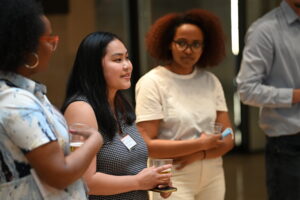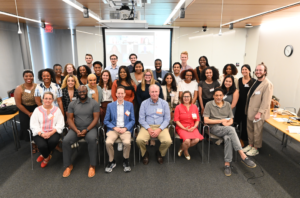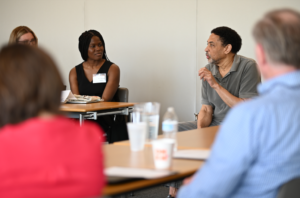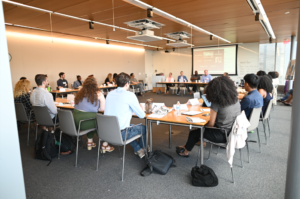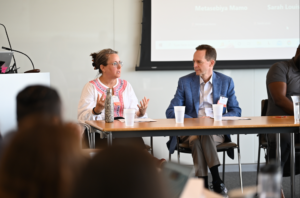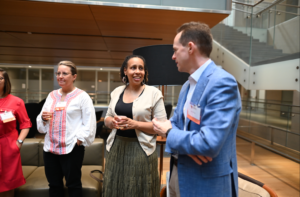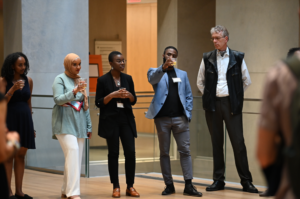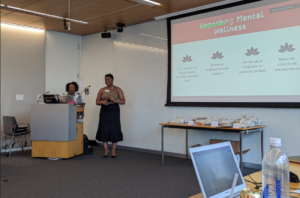May/June 2022
Dear Friends,
I hope this edition of the Princeton in Africa Fellows Flyer finds you well. This is an exciting time for our organization. May began with the addition of seven new board members to our board of directors. These individuals have already shown incredible support for our program and Fellows by joining and contributing their knowledge to our 2022-23 Fellow’s Orientation. We are grateful to have Ettie Philitas, Steven Feldstein, Grace Penn, Robert Wolk, Dr. Jacob Dlamini, Amaka Anku, and Dr. Mahiri Mwita as part of our PiAf community.
We were happy to have joined Princeton University in celebrating their first in-person reunions since 2019. On May 21st, Princeton in Africa welcomed PiAf alumni, board members, and friends to our Post P-Rade Reception. Thank you to all that stopped by and visited the PiAf family.
By the end of May, Princeton in Africa completed our Fellows placement process. The process began in December when staff, alumni and board members reviewed nearly 200 applications submitted to us by highly-qualified and unique young professionals. We are honored to announce that we have placed 27 Fellows with 17 different host organizations in 13 countries. This will be our first fully in-person fellowship year since 2019. This cohort of Fellows are all motivated, bright and passionate individuals ready to begin working with their host organizations and living on the African continent. Please keep yourself updated on our Princeton in Africa Instagram, where we will soon be welcoming our new Fellows and wishing our 2021-22 Fellows farewell on their post-fellowship journeys.
On June 2nd, PiAf began its first in-person Fellows’ orientation since the COVID-19 pandemic began in 2020. We’ve come a long way with our program, and are so happy to be back to in-person programming where we can meet our 2022-23 Fellows face-to-face. Thank you to all our guest speakers, alumni and board members who came to speak to our Fellows, educate, and show support.
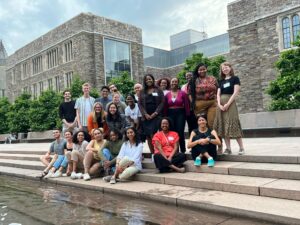
With many of our 2021-22 Fellows year-long placements coming to an end, we are honored to host our 2022 Retreat in Kigali, Rwanda. We have welcomed our 2020-2021 Fellows to this retreat as well, where many of them will finally get to meet staff and members of their cohort in person. This retreat in Rwanda is the perfect opportunity for our Fellows to reflect on the impact they made in their host organizations and the personal and professional growth they have experienced during their year-long fellowships. Subscribe to our Fellows flyer mailing list so you can be the first to receive our next Fellows flyer, which will show highlights of our retreat!
Exciting events took place yesterday, Thursday, June 30th in Kigali. As part of our retreat, we have welcomed professionals from all over the African continent and beyond to join us to network, connect and grow our Princeton in Africa community. We graciously hosted Jasmin Church, Veda Sunasee, Gracie Rosenbach, Shaquilla Harrigan and Reid Whitlock to our Career Panel, where they discussed their career trajectories, shared their experiences at different levels of their careers and mentored our 2020-21 and 2021-22 Fellows as they progress in their own careers.
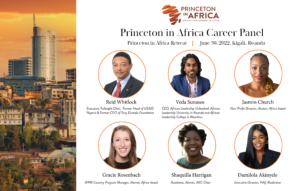
We also hosted a fireside chat with Reid Whitlock, who has been and will continue to be an invaluable resource for our PiAf Fellows, alumni and staff. Reid Whitlock has led four different institutions, The Tony Elumelu Foundation – one of Africa’s most
important and well-endowed philanthropies — in Lagos, Nigeria, the School of Finance and Banking (now, the University of Rwanda) – one of Africa’s pre-eminent universities — in Kigali, Rwanda, the South Sudan and Rwanda activities of the international consulting firm On The Frontier (OTF) – a spin-off of the Monitor Group, and the U.S. Government Provincial Reconstruction Teams in Diyala and Taji provinces in Iraq. He is a lawyer, linguist, business administrator and economist by training, with degrees from universities well-known for their rigor and excellence. He is a frequent public speaker on professionalization and competitiveness.
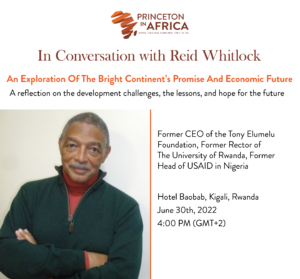
Princeton in Africa is honored to announce that we hosted our inaugural International Networking Event, The Connect. This is a professional development event for our community and partners.
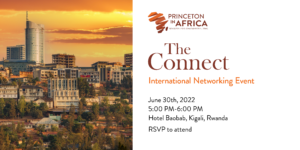
Thank you for your continued support and engagement with Princeton in Africa.
Warm Regards from Kigali,
Damilola and the PiAf team
PiAf Connections
Please click below to check out pictures of our Fellows, Alums and other members of the PiAf family meeting up at home and around Africa.
Notes from the Field
By Emma Anderson, '21-'22 Fellow with International Rescue Committee in Somalia (based in Kenya)
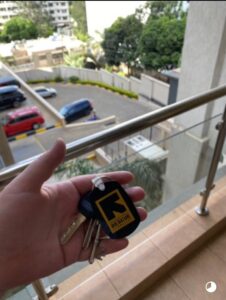
Keys to the guesthouse that I got on April 1!
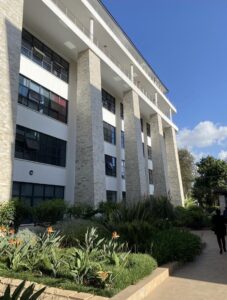
IRC offices in Nairobi, which comprise of IRC Somalia, IRC Kenya, and regional headquarters
My time as a Fellow has challenged me in ways I could have never predicted. I’ve been lucky enough to transition to on-site work in Nairobi, but I am not in Somalia – which presents its own set of dilemmas that I consider often.
While I have been deliberating and pondering a lot since arriving in Kenya, one idea that I keep returning to is the question of how we can resist the crisis narrative surrounding Somalia. It is so important to respect the very real trauma that comes with surviving and thriving in a complex, nuanced, and often violent place. At the same time, we (at the IRC, and as a PiAf community at large), need to (re)center and challenge the idea that Somalia is a lost cause, a place where people know nothing but struggle. We have created a false dichotomy where people living in humanitarian crises are reduced to being just that.
I personally reject the “resilience” narrative that we see so often in the development/humanitarian sector, as I do not ascribe to the belief that it is the fault of individuals to pull themselves out of struggle (which is what neoliberalism taught us to think). We should be inspired by Somali people surviving harm and violence – but we should also provoke a conversation on why Somalia and its people struggle at all, and why we demand strength and tenacity from people living in crisis in order to “inspire” ourselves. Somalis should not have to be resilient in order to be considered worthy of attention, support, and most importantly, representation as diverse as they are. “Resilience” blinds us to the multiplicity of experiences in places that are not easy to live in, among people who navigate every day these nuances that I only write/think about.
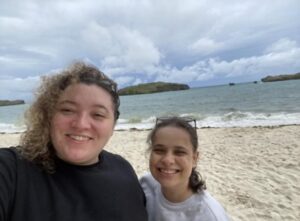
My fellow Fellow and roommate Janhavi and I at the coast of Kenya!
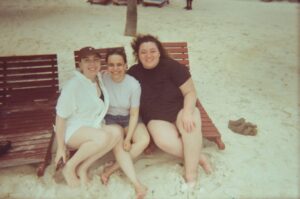
Janhavi, myself, and our friend Grier on a trip to the coast for a long weekend!
I will not say that the people of Somalia and its diaspora are resilient because it is reductive and white savior-like. What I will do, however, is push for a narrative as nuanced as a place like Somalia is. As a PiAf fellow lucky enough to have the experience of living and working in East Africa, and from an emergency response setting, I believe firmly in our ability to shift the narrative and the power in this shift.
My work at IRC Somalia has taught me how to manage, analyze, brainstorm, lead, collaborate, and approach what, at times, may feel like a detached approach to local-level change with a thoughtful and context-based mindset. It has been formative, thought-provoking, and filled with immense growth. Most importantly, it actively requires me to evaluate and then interrupt my own and others’ misconceptions about Somalia. I do believe this is the way forward.
Notes from the Field
By Jada Elder, '21-'22 Fellow with Equal Education in South Africa
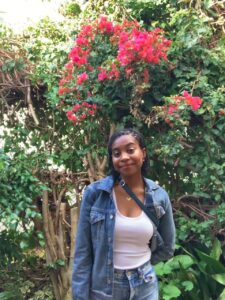
Cape Town is absolutely stunning

Class of 2021! Go Owls!
Sawubona from South Africa! My name is Jada Elder, and I am incredibly grateful for the opportunity to work as a Researcher with Equal Education (EE) in Cape Town. I have only been here for a little over two weeks, but I already have an enormous appreciation for this coastal city’s natural beauty and character. I’ve been a fellow with EE for 11 months, but just having moved here I feel as if my journey with the organization is only beginning! Though working remotely from my hometown had its perks (I doubled my collection of houseplants!) working in EE’s Western Cape office has allowed me to take on several fascinating and impactful projects that I am incredibly proud to be a part of. Recently, I have had the opportunity to make important contributions to Equal Education’s submission on the Basic Education Laws Amendment Bill, the most significant amendment to the South African Schools Act in the past 10 years! This project has allowed me to collaborate with civil society organizations throughout South Africa. As an aspiring human rights attorney, this has been an absolute dream!
I often think of the extraordinary excitement I felt when I received the notification that I was chosen as a Princeton in Africa Fellow. I got the email in the middle of a virtual English class during my last semester of graduate school, and I could not wait to call my Mom to tell her the good news: I was moving to Africa (at some point)! While my PiAf cohort had the unique experience of beginning our fellowships remotely, I have nonetheless felt very connected to my host organization, and to this truly dynamic cohort of fellows. It has been extremely valuable to learn from the experiences of the previous EE PiAf fellow, and an absolute pleasure to pass on my experiences to the next EE fellow. Big shoutouts to Zuwaina and Elebetel!

Hiking Kloof Corner. What a view!

It’s winter now, but there are still lots of good beach days!
As I reflect on my time with PiAf and EE, I feel incredibly grateful for the opportunity to make an impact on issues that I deeply care about. Equal Education is truly the most incredible non-profit that I have come into contact with. I have seen first-hand how its commitment to advocating for equality in the South African education system has truly changed the world for the better. Over the past 14 years, EE has more than earned its title as a leader in youth leadership development, and it feels great to play a positive role in the lives of so many young people. Cape Town itself has welcomed me with open arms, and I am even taking isiZulu language classes on the weekends, as I will surely be back! Hambani kahle!
Notes from the Field
By Yara El-Khatib, '21-'22 Fellow with Population Services International in Côte d'Ivoire
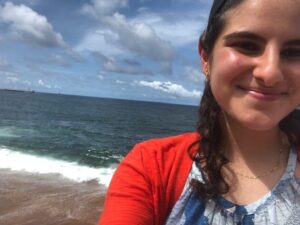
Yara taking in the sea breeze in Abidjan at the end of a regional conference, where she met many of her colleagues in person for the first time!
Hello from Pittsburgh, Pennsylvania! I’m Yara El-Khatib, and I’ve spent the last 10 months working remotely with Population Services International (PSI) based in Abidjan, Cote d’Ivoire and Maputo, Mozambique! It feels surreal that I’ll be transitioning onsite to Cotonou, Benin in just a few days to round out the last two months of my fellowship, and I could not be more excited. In fact, I got a taste of what being on the continent for my fellowship will feel like just a few weeks ago, when I had the opportunity to travel to Abidjan for a regional conference with my supervisor and other colleagues. The verdict? I’m in store for an amazing end to my fellowship!
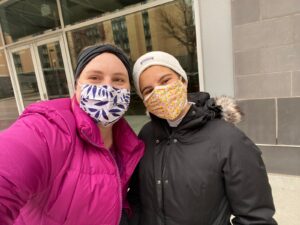
Yara meeting her PiAf Alumni Mentor (Sam Archie) in person in downtown Pittsburgh.
Despite working remotely for most of my fellowship, I’ve had the chance to work on a wide variety of projects and work with various colleagues across PSI’s offices in Mozambique and Francophone West Africa (FWA). On both teams, I support research, evidence, and M&E efforts involving social marketing projects that address sexual and reproductive health and rights (SRHR). The responsibilities with which I’ve been entrusted have allowed me to grow in many ways as an individual and professional; notably, I’ve strengthened and built skills in both qualitative and quantitative analysis, digital communications and marketing, report writing, strategy development, and more.
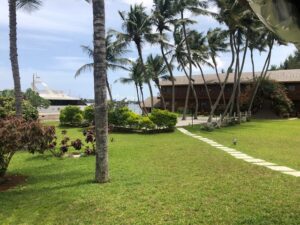
A lagoon-side view from the conference hotel in Abidjan this past May.
Recently, one of the largest responsibilities I’ve been given has been to lead the documentation of a 5-year-long family planning and safe abortion project in Mozambique. Through this process, I developed an interview guide, coordinated interviews, and analyzed 56 interview transcripts digitally. Doing so has allowed me to read firsthand the successes and challenges that our organization’s health providers, partners, and clients have seen throughout the project. Since I have not been able to go into the field, these interviews have been incredibly meaningful in helping me better grasp the structure and nature of the project. I have just begun drafting the report and other deliverables that will reflect on the interviewee’s responses and hope to share them internally and externally before the end of my fellowship.
As I prepare to travel onsite, I am excited to find new communities in Cotonou. For example, I am an avid ultimate frisbee player and have been playing a lot around Pittsburgh while working remotely. I hope that I can find an ultimate frisbee community in Cotonou—funnily enough, a similar community in Lilongwe back in 2019 was how I found out about PiAf, as one of the players was wearing a PiAf shirt and encouraged me to apply!
Notes from the Field
Princeton in Africa 2022 Fellows' Orientation Highlights
Our 2022-23 Fellows’ orientation was a success- with 22 Fellows joining us in person and 5 joining us remotely through zoom. During our 2021-22 Virtual Retreat for our current Fellows, Professor Mahiri Mwita, now a member of our board, facilitated the session “Effects of Colonialism, Imperialism and PiAf’s Role in Change.” As this newly incorporated session was a thought-provoking success among our current Fellows, alumni Ettie Philitas, who is a new member of our board, and Lola Flomen volunteered to facilitate this session for our upcoming cohort. This was an important topic that included a reflection on the narratives surrounding the African continent, and how our Fellows can continuously question and challenge these narratives- and themselves. Other sessions in this orientation include Identity with Jasmin Church and Olivia Woldemikael; PiAf Alumni Panel with Jasmin Church, Ettie Philitas, Stephanie Rapp, Dan Robinson and Walter Lohmann; and Mental Health and Wellbeing with Oluseyi Segun.
Thank you to all of our guest speakers, alumni, and board members who joined this year’s orientation sessions.
Margot Popowycz (CISI)
Robin F. Maestipieri (University Travel and Immunization Services)
Anna Charles (The Konterra Group)
Jasmin Church (eleQtra, Uganda, 2015-16)
Olivia Woldemikael (World Food Programme, Uganda, 2015-16)
Kara Amoratis (Global Safety and Security at Princeton University)
Ettie Philitas (ALA, South Africa, 2009-10)
Stephanie Rapp (Generation Rwanda, Rwanda, 2012-13)
Dan Robinson (Olam, Ghana, 2013-14)
Samantha Archie (IRC Sierra Leone, Sierra Leone, 2019-20)
Susan Tuberville (Maru-a-Pula, Botswana, 2015-16)
Lauren t’Kint (Integrate Health, Togo, 2018-19)
Ela Hefler (IRC Somalia, Kenya, 2018-19)
Audrey Atencio (UN World Food Programme, Uganda, 2014-15)
Jillian Randolph (CCBRT, Tanzania, 2019-20)
Lola Flomen (PSI, Côte d’Ivoire 2019-20)
Oluseyi Segun (Gardens for Health International, Rwanda, 2014-15)
Bryant Blount (PiAf Board of Directors, Secretary)
Daniela Kaisth (PiAf Board of Directors)
Rob Wolk (PiAf Board of Directors)
Jim Robinson (PiAf Board of Directors, President)
Rebecca Grave-Bayazitoglu (PiAf Board of Directors)